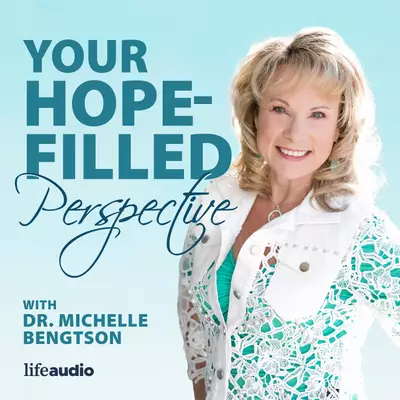Listen on Your Favorite App
Your Hope-Filled Perspective with Dr. Michelle Bengtson podcast
Dr. Michelle Bengtson
Your Hope-Filled Perspective draws on Dr. Michelle Bengtson’s almost 3 decades of clinical expertise as a neuropsychologist to help her listeners regain hope, renew their minds, and transform their lives. With a perfect balance of clinical expertise, compassion, and vulnerability, Dr. Bengtson and her guests purpose to share Biblically-based hope-filled perspectives for real-life issues, struggles, and concerns. Voted #2 in 2022's Podcast Magazine's Top 50 Moms in Podcasting.
Listen on Your Favorite App
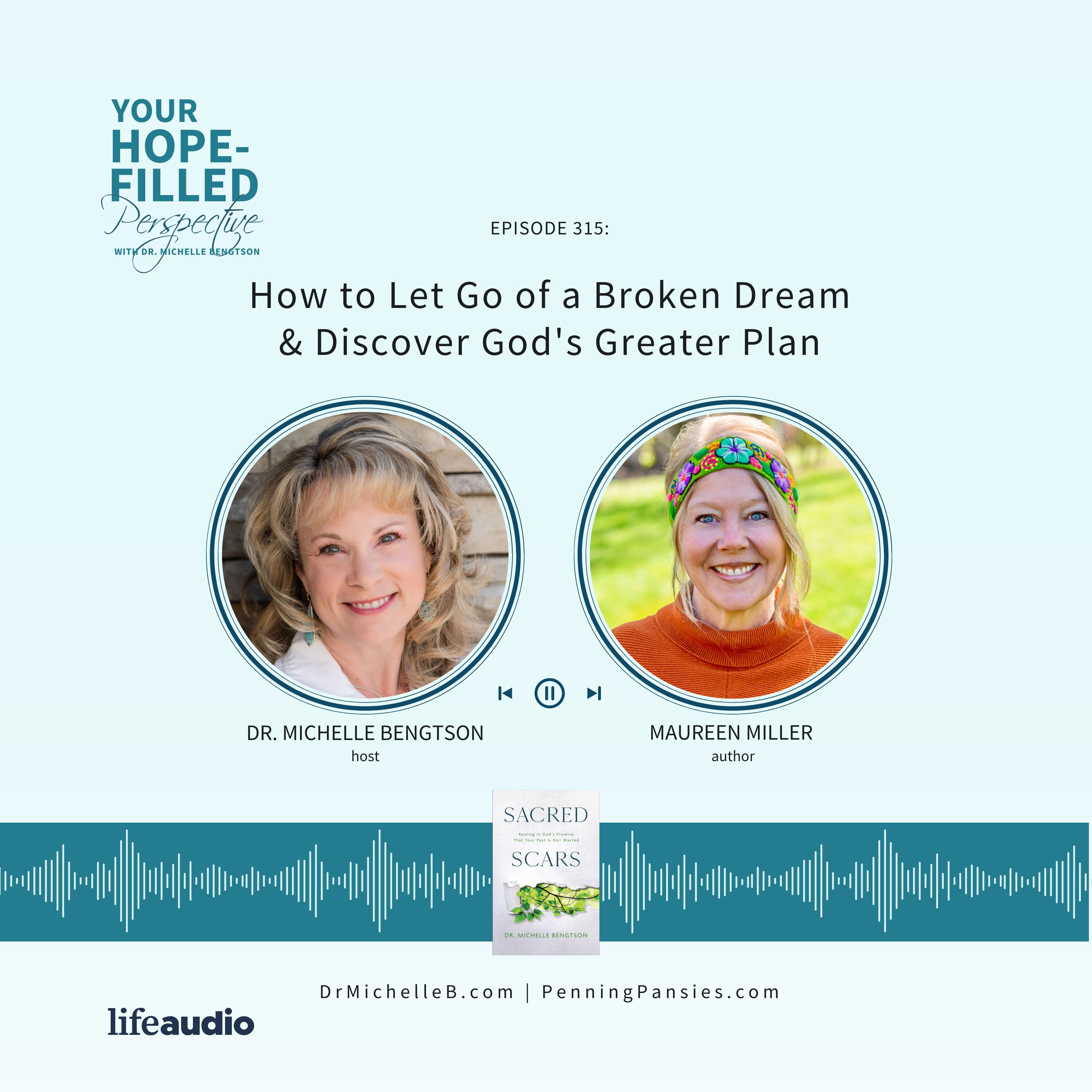
How to Let Go of a Broken Dream and Discover God's Greater Plan
April 24, 2025 - 19 min
Episode Summary: In this episode of Your Hope-Filled Perspective, we are continuing the Sacred Scar Story Series during which I’ve had the blessing to interview many people who have experienced some very painful wounds, but then saw God heal and do a redemptive work and bring about beautiful sacred scars. Maureen Miller shares about her devastatingly painful wound when she had dreamed of becoming a mother since early childhood only to have doctors report that short of the miraculous, she would be unable to conceive. She shares how she coped with her pain and her grief, and how God ultimately fulfilled her dream of motherhood through adoption. Quotables from the episode: Everyone has a story about something that has wounded them and caused pain. My scars have been more emotional scars having to do with the loss of a dream since I was a little girl, of being mom and so looking forward to having children and being able to do all the things that moms love to do with their kids. I married my high school sweetheart and not long after that we realized we were going to have difficulty conceiving. It was painful to hear a doctor say that short of the miraculous, you will never have children biologically. Those words felt like the death of a dream and cut very deeply. Having been raised in a Christian home, and having a good grounding in biblical truth and God’s promises, it wasn’t long before I really began seeking the Lord and asking him how he might use this pain for something good and bring something beautiful out of my broken body. I mourned and I grieved the death of that childhood dream that I had held onto so tightly. There was a season when I shook my fist at God, but it wasn’t a long season. As I began to delight myself in the Lord, and be real with him, and at times even shake my fist, he can not only handle all my doubts and fears and anger, but he can even pry open my hands that were clenching that dream. He began to show me that as I prayed with my hands up and open, he could either take that dream away and replace it with something better, or he could grant me that dream in some miraculous way. As I meditated on the scripture and began to delight in the Lord, it didn’t mean that God would always answer our prayers in the way we wanted them answered, but he would actually fill our hearts with the dreams he had for us first and those would become our dream. As I mourned then sought the Lord and delighted in Him first, He began to show me that it was his dream for me to be a mom—it just didn’t look like I thought it would. We have the choice when we are wounded to either turn toward God and seek him or turn away and walk in the other direction. There was shame because I had to really remind myself that my identity as a woman was not wrapped up in me being a life-giver. My identity came in Christ and who he created me to be. The Lord confirmed for me that I was “blessed in my barrenness.” Our pain became a catalyst for me to offer sympathy, comfort, and help for those he places in our paths. I realized I had the ability to minister to birth mothers who chose life for their children, carry them for 9 months, and then give others the greatest gift of life they could ever give. When God impressed upon me that I was “blessed in my barrenness,” I realized my condition wasn’t a mistake and that God had given me a heart to sympathize and empathize with those who are hurting. Over time we were able to adopt three children, but we also experienced the pain of two failed adoptions that have their own sacred scars and round out our story. It’s a beautiful thing when we’re able to hold up our dream and offer it to God and say “Take this dream if it’s not yours, and you have something better, or if it is your dream, confirm it so I can walk it out in faith and joy knowing it’s according to your will.” Delight yourself in the Lord. Spend time with Him in His Word. Spend time with God in prayer. Surround yourself with Christian brothers and sisters who can really speak into your life and confirm the truth. Know your identity in Christ and surround yourself with people who will remind you of that. Trust that according to Romans 8:28, God will work all things together for good for those who love Him and have been called according to His purpose. Journal so you can go back and look at the “stones of remembrance” and you can remember how God answered prayers. Once I surrender my will and my way, God has the freedom to work His perfect will, in His perfect way, and in His perfect timing. Scripture References: <strong
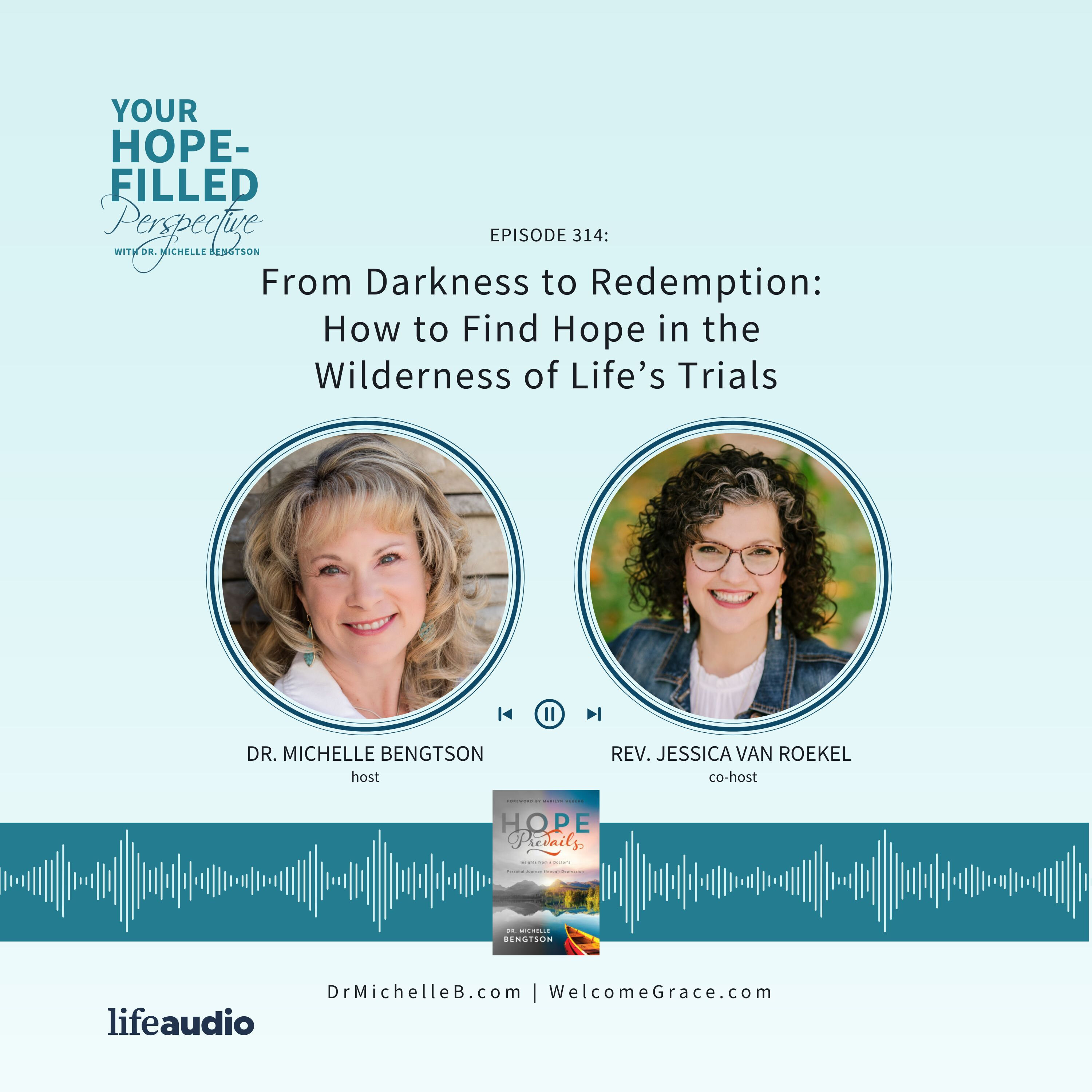
From Darkness to Redemption: How to Find Hope in the Wilderness of Life’s Trials
April 17, 2025 - 35 min
Episode Summary: In this episode, my co-host, Rev. Jessica Van Roekel and I reflect on the journey from the darkness of Good Friday to the redemption of Resurrection Sunday. For Jesus’s disciples and followers, Good Friday marked a day of despair, while Saturday felt like a wilderness of uncertainty. Yet, Resurrection Sunday brought the hope of resurrection, redemption, and purpose. Together, we’ll examine how these themes resonate in our own lives when we walk through dark seasons and wilderness experiences, and how we can hold onto hope, knowing that redemption is always possible through Christ. Quotables from the episode: Even though Jesus warns us we will experience trials, they often take us by surprise just like Jesus’s death did for the disciples. Nothing happens to us that isn’t first sifted through God’s hand. God has a plan, sees the whole picture, and offers his comfort. Prayer and lament: Honest communication with God, expressing pain, confusion, and doubt. Meditate on Scripture: reflecting on Bible passages that highlight God’s faithfulness in difficult situations. Practice gratitude: remember past instances of God’s provision as encouragement for the present trials. Fasting: set aside time for fasting to seek clarity, alight with God’s will, or pursue deeper spiritual intimacy. Worship and praise: praise God for who He is, even when circumstances feel bleak. Community and Fellowship: share your struggles with trusted believers who can pray and provide encouragement. Silence and solitude: spend intentional quiet time with God, listening for his voice and his presence. Remembering God’s faithfulness: reflect on his unchanging nature and promises. God often uses our darkest moments to bring about the greatest redemption. Lean into God’s promises during dark and wilderness seasons. Look for glimpses of God’s redemptive work, even when it feels far off. Remember that life’s trials often follow the pattern of Good Friday, Saturday, and Resurrection Sunday. The darkness of despair can give way to the wilderness of waiting, but the story doesn’t end there. Resurrection Sunday reminds us that hope and redemption are always on the horizon. No matter what season you’re in, trust that God is at work, bringing beauty out of ashes and life out of death. Scripture References: Luke 23:44-46 (The darkness of Good Friday) Isaiah 43:19 (God’s work in the wilderness) John 20:1-18 (The resurrection on Easter Sunday) Romans 8:28 (God’s redemptive purposes) Recommended Resources: Reframing Rejection: How Looking Through a Different Lens Changes Everything By Jessica Van Roekel Sacred Scars: Resting in God’s Promise That Your Past Is Not Wasted by Dr. Michelle Bengtson The Hem of His Garment: Reaching Out To God When Pain Overwhelms by Dr. Michelle Bengtson, winner AWSA 2024 Golden Scroll Christian Living Book of the Year and the 2024 Christian Literary Awards Reader’s Choice Award in the Christian Living and Non-Fiction categories YouVersion 5-Day Devotional Reaching Out To God When Pain Overwhelms Today is Going to be a Good Day: 90 Promises from God to Start Your Day Off Right by Dr. Michelle Bengtson, AWSA Member of the Year, winner of the AWSA 2023 Inspirational Gift Book of the Year Award, the 2024 Christian Literary Awards Reader’s Choice Award in the Devotional category, the 2023 Christian Literary Awards Reader’s Choice Award in four categories, and the Christian Literary Awards Henri Award for Devotionals YouVersion Devotional, Today is Going to be a Good Day version 1 YouVersion Devotional, Today is Going to be a Good Day version 2 Revive & Thrive Women’s Online Conference Revive & Thrive Summit 2 <a hr
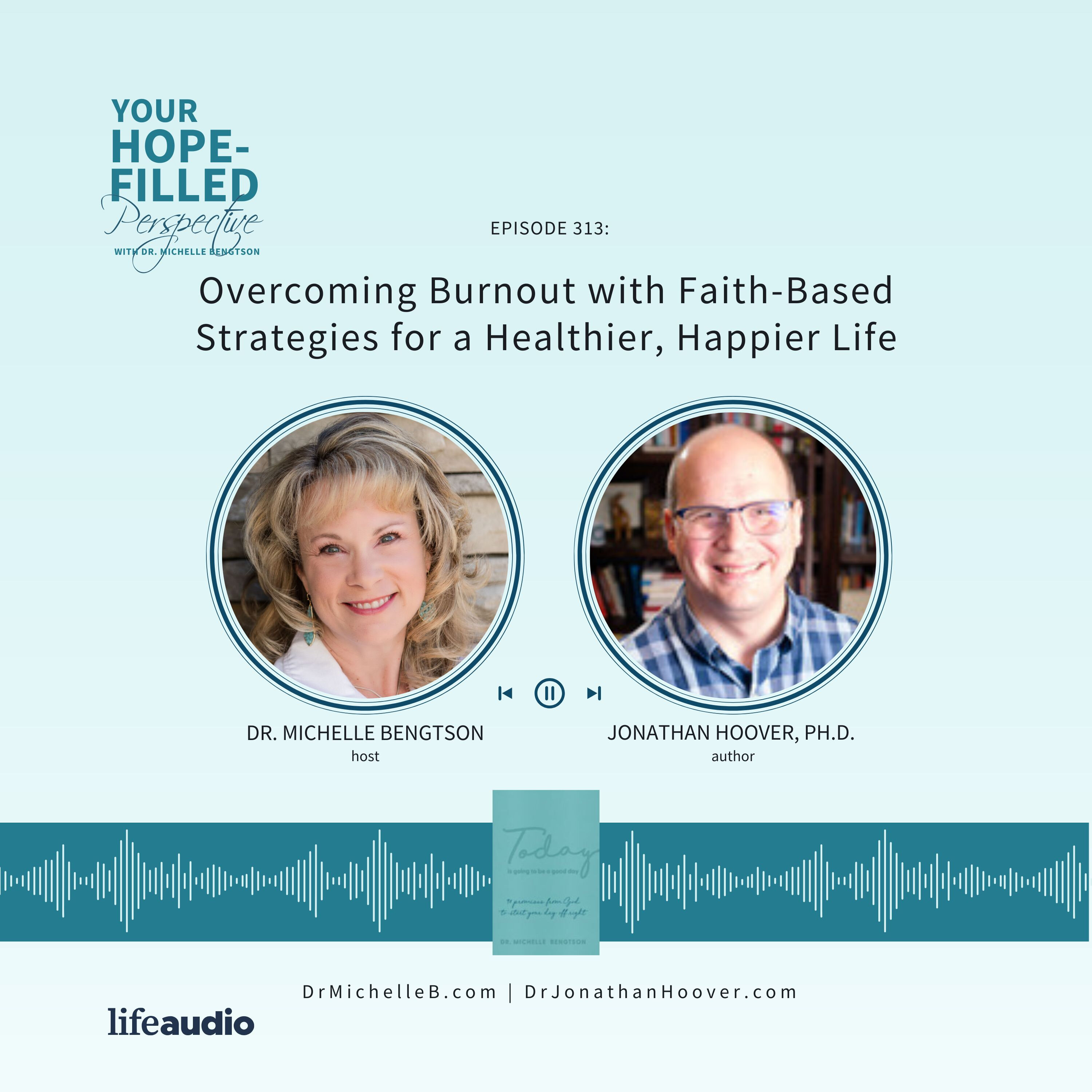
How To Overcome Burnout with Faith-Based Strategies for a Healthier, Happier Life
April 10, 2025 - 30 min
Episode Summary: A recent survey of 15,000 workers across 15 countries found that a quarter of all workers experienced burnout symptoms, but many don’t recognize it for what it is until after the crash has occurred. Join me with Dr. Jonathan Hoover, author of Stress Fracture: Your Ultimate Guide to Beating Burnout. Together, we will unpack the root causes of burnout and explore how it impacts physical, emotional, and spiritual well-being. Dr. Hoover shares actionable strategies and faith-based insights for recognizing stress fractures in life and taking steps to heal holistically. With practical advice, scientific understanding, and a focus on hope, this episode will equip you to overcome burnout and restore balance, resilience, and joy. Quotables from the episode: We can go from being okay to not being okay really quickly. Burnout is a legitimate path straight to depression. I found out that it’s (burnout) not a unique situation. It happens a lot, and especially even to people that we would look up to as incredibly productive people. It is very, very common, especially amongst highly productive individuals, because we have a tendency to even push through our body's normal signals that, hey, you need a rest. We kind of push through and go, I'll take time for a rest after I get this done, after I get that done and we don't take the time. But I think what is hard and your example of your father's experience is that often we don't see the early signs of burnout and we don't recognize it for what it is until after we've hit rock bottom. Burnout specifically tends to happen to people that are very driven. And we want to do lots of things and we want to take on the world and we dream big and we execute big. But sometimes we execute beyond what God is calling us to do. And we have to grieve the fact that there are lots of good things we could do but Paul taught us that not everything I could do is something I should do. There is something about the emotions we experience that are at the core of who we are as a person. And we sort of use that emotional capital in understanding how other people feel, sharing with them how we feel, using our emotions to achieve goals, exercising our emotions to be Christ -like. I mean, tells us about Jesus' emotion. So often we see that Jesus was compassionate. That is an emotion. And there is a season where Jesus wants to get off by himself because there wasn't even enough time for them to eat. Him and his disciples didn't even have enough time to eat. But what you see is that what was he tired of doing? He was giving of himself emotionally. There was this compassion, there was the desire to help people who were struggling. And we don't realize in our daily life how much emotional capital we are doling out from our emotional wallet. When it comes to caring about our kids, caring about our spouse, caring about our job, putting our passion and energy into our life's calling and At some point what can happen is we can write those emotional checks beyond what the balance is in the account That's what happens with burnout is and that's why it can start with such a benevolent and well-meaning direction in life. I want to give as much of myself as I can to as many people as I possibly can I want to accomplish big things, nothing wrong with any of that, until we write a check that's bigger than the balance. And then what happens is, this is something that we're still trying to figure out psychologically. There is a sort of, of last straw that happens with emotions. We haven't figured it out yet, but you go from being okay to not being okay very fast, very fast. And that is I think what is so challenging when you work with people as I do who are burned out is one day they're doing fine, and then the next day they're not. I like to treat the analog of going to the gym as a good way of thinking about burnout. So if I'm going to the gym and I'm hurting myself because I'm pushing myself beyond my limits. So let's say I go and I try to lift too much weight or something like that. I have three options for how to deal with it. I could, one, reduce the weight that I'm lifting. So sometimes when I work with people who are burned out, my first suggestion is let's try to figure out what we can delegate that you do. Let's figure out how to get you doing what only you can do and find a way to get people, other people to help you do what other people could do. Sometimes I have to work with people to say, well, the reason it's so difficult for you is it has to be perfect. Perfectionists tend to get burned out faster than anybody else. So we have to learn that science of good enough. Burnout can happen in a lot of arenas. It can happen in marriage. It doesn't have to be work. But whatever arena I'm burning out in, the question
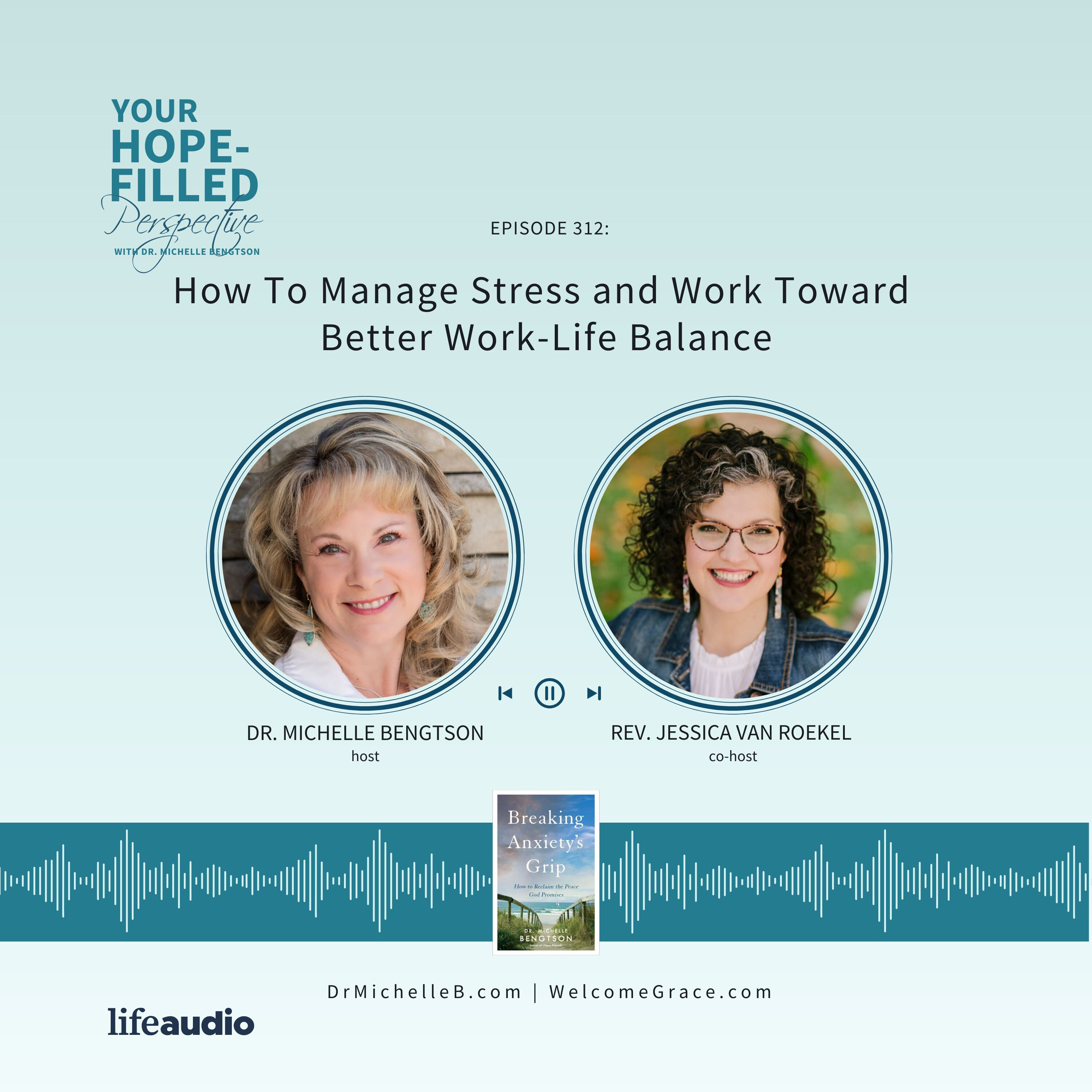
How To Manage Stress and Work Toward Better Work-Life Balance
April 3, 2025 - 34 min
Episode Summary: In this episode of Your Hope-Filled Perspective, I’m joined by my friend, Pastor Jessica Van Roekel, as we talk about something so many of us are facing today—the growing challenges of stress and a work-life balance that feels anything but balanced. Together, we share from our personal stories, our professional backgrounds, and, most importantly, from a place of faith. We offer practical strategies to help you reclaim peace, set healthy boundaries, and redefine what true success looks like. My hope is that through our honest conversation, you’ll be reminded that grace and flexibility are available, and that lasting peace is found when we anchor our lives in faith. Quotables from the episode: Stress is something we all face to a greater or lesser extent. We live in a culture that promotes “If it’s going to be, it’s up to me” but if we aren’t careful to attend to appropriate stress management, prolonged stress can have a detrimental impact on our physical, emotional, mental well-being. If we go too long, for too strong, ultimately our bodies will demand we stop. So how do we work toward better work-life balance? Stress comes from a variety of places, but if we don’t learn to manage stress, it will manage us. We as women struggle with the work/life balance in a unique way because culture tells us success is gained or lost in the workplace, yet we are often the primary caregivers for our family (including everything from laundry to holiday costume sewing to permission slip signing to kissing boo-boos). In 1970, about 43 percent of women ages 16 and older were in the labor force. By 2000, 61 percent of adult women were in the labor force and that has continued through today. Arguably, today women have more on their plates than a generation ago, with less down time to rest and restore. Stress is a physiological and psychological response that occurs when we perceive a threat or challenge that EXCEEDS OUR COPING RESOURCES. This perception triggers the body's CENTRAL STRESS MGMT SYSTEM, particularly the hypothalamic-pituitary-adrenal (HPA) axis and the sympathetic nervous system (increased Heart Rate, Blood is directed to our muscles, increased alertness so you can face danger or run away) leading to the release of stress hormones like cortisol and adrenaline. Once stress passes, the HPA axis should return to normal but often doesn’t because we live life in a heightened state of stress. Our brain doesn’t know the difference between good stress and bad stress. While this natural stress response is useful for short-term danger, chronic stress keeps these hormones elevated for extended periods, which can harm both mental and physical health. Perfect balance is a myth; instead, balance is fluid and flexible. Sometimes career demands take precedence, while other times, family needs do. Extending grace to yourself and adjusting priorities based on seasons of life can prevent both guilt and burnout. The myth of “multi-tasking”—it’s physiologically impossible for your brain to multitask. Physically, chronic stress can cause headaches, muscle tension, fatigue, and a weakened immune system. It also raises the risk of heart disease, high blood pressure, digestive issues, and sleep disturbances, impacting overall physical wellness. Stress has significant effects on brain function and structure. ACUTE stress can sharpen focus and improve short-term performance by enhancing activity in brain regions like the amygdala and prefrontal cortex. However, chronic stress can have adverse effects and lead to structural changes in the brain, such as a reduction in the size of the hippocampus (affecting memory) and prefrontal cortex (affecting decision-making and executive function), while potentially increasing the size and activity of the amygdala (heightening emotional responses). Chronic stress often leads to constant worry, difficulty concentrating, and memory issues. The brain, under prolonged stress, struggles to function optimally, making it harder to focus and think clearly. Emotionally, prolonged stress can lead to feelings of irritability, anxiety, and even hopelessness and despair. It can cause mood swings and may contribute to depression, as persistent stress wears down emotional resilience. Constant connectivity has been shown to increase stress, as people may feel pressured by comparisons, notifications, and the need to stay updated. Increased academic and career pressures, societal instability, and economic uncertainty can all contribute to heightened stress. H
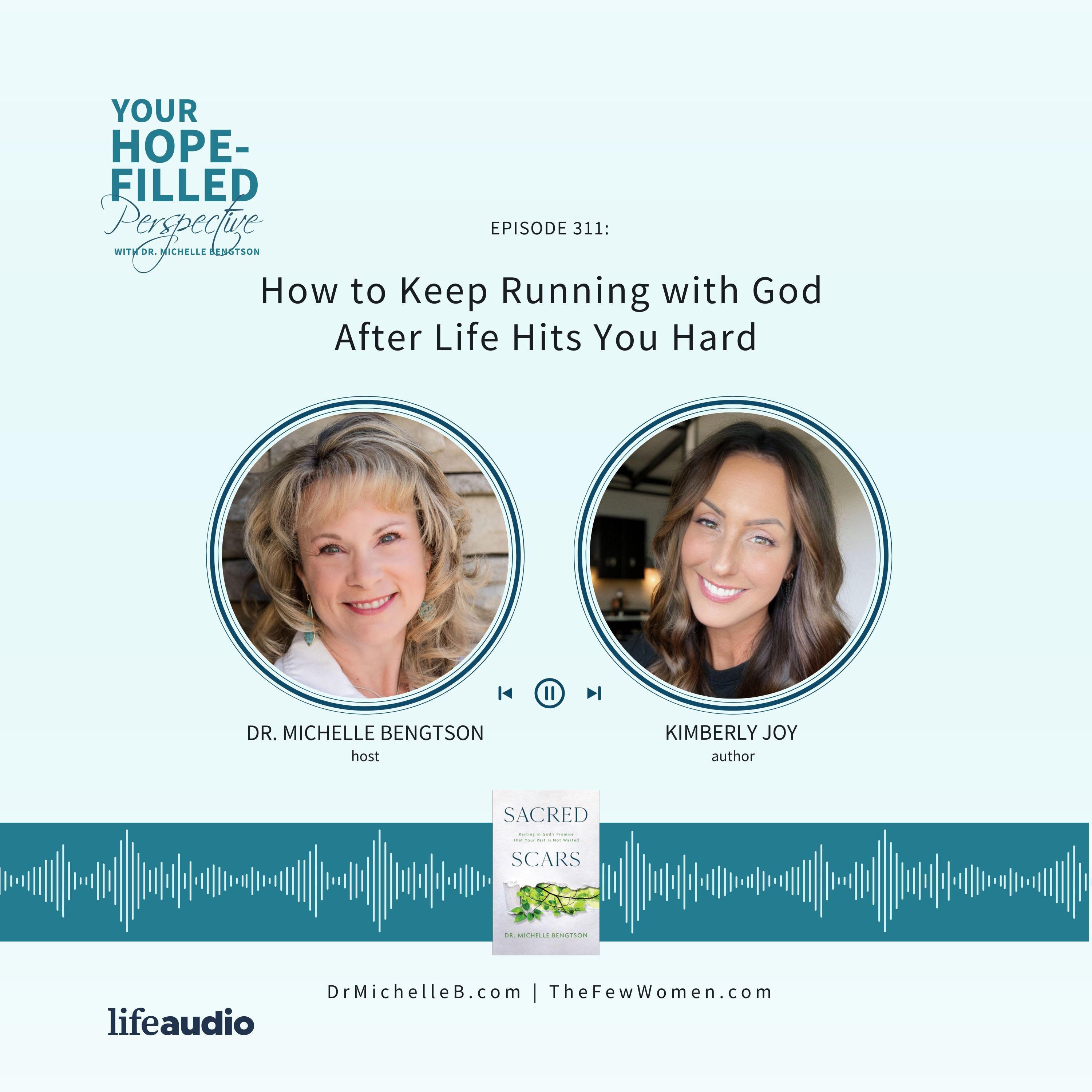
How to Keep Running with God After Life Hits You Hard
March 27, 2025 - 30 min
Episode Summary: When we talk about wounds, pain, and scars, we need to remember that those come in the form of physical, emotional, relational, spiritual, grief and loss. This week’s guest, Kimberly Joy, shares of severe physical pain she endured after being hit by a car when she was out for a run, and the excruciating recovery she endured, but how she experienced God has her comfort and coach throughout her recovery. Her story is a powerful reminder of how to keep running with God after life hits you hard. I know you’ll be encouraged by her story! Quotables from the episode: Everybody I meet has gone through some painful trials, whether it's physical pain, relational pain or even spiritual pain or grief or loss. And what amazes me time and time again is that frequently those really painful trials that we've been through are an opportunity for God to use us to minister to others. Have you ever felt like what happened to you was like getting hit by a car? Well, I actually did get hit by a car! At the hospital, doctors said, “well, the good news is you've only broken bones. And they said, this is a miracle. We don't know how you have no internal organ damage, no spinal cord damage, no brain damage, no head injury. All you have are broken bones, but are you ready for the bad news? And I said, yeah, what's the bad news? They said you broke the two most painful bones in the human body, your pelvis and your ribs.” I was no stranger to pain. But I'm telling you, this pain was unlike anything I could even describe. I describe it as a thousand sharp objects being stabbed into my body in some medieval torture session. I just want to say this to your listeners, whether it's a relational, financial, physical, whatever, spiritual injury, the way that we immediately blame ourselves is so from the pit of hell, you know, that we would immediately heap condemnation right onto our wound. And that's what I did. And but I didn't blame God, and I wasn't mad at him. And I just thought the Lord is with me. I've done a lot of things with him that were hard. This is another thing that God and I are going to do together. That was my attitude. This is another thing God, and I are going to do together. And he's never failed me. So, he's going to not fail me now. And I had an attitude of faith, but also that underlying self -blame. The question to ask is who, not why. Who, Lord, do you want to be for me in this pain? Who is the question I've learned to ask, are you going to be my healer, my savior, my deliver, my friend, my comforter? Who are you going to be? And I already knew he was being my comforter. It was the most fearless season of my life, which made no sense, which proved to me. He was so with me, that peace that he gave me when I rolled up onto the hood of the car had not left me. **You can tell the size of your destiny by the size of your opposition. This pain, this problem is evidence of the size of your destiny. This is not evidence of your foolishness running out in the middle of the street. This is not evidence about how you do everything the hard way because I had to stay awake while I was being hit by a car. This is evidence of the size of your call. Previously, God told me to run. And so I thought, if I can run in the physical, I can run in the spirit. And my evidence, Michelle, was I crossed a finish line of a half marathon. One month later, I couldn't even walk. One month later, I came home in a wheelchair. And this was my enemy's direct and immediate assault on two things I did that put me closer to my destiny than I had ever been. So I decided that I was going to come back stronger, go further, and do it bigger. And Lord, whatever dream you put in my heart, stretch out the tent pegs, expand my borders, because if he thinks that he's going to kill me before I do what I was put on this earth to do, he's got another thing coming. And this holy indignation just rose up in me. The doctor came in the next morning and told me that it would take a year to recover from my injuries. What was in my mind was this message God had given me that this was a direct and immediate assault on my destiny. And I knew that this race that I had just run 30 days prior was happening again in 11 more months. And so, I looked at the doctor and I said, I'm going to be running a half marathon in 11 months. I ran that race in 11 months. Eleven months later, I crossed that finish line, that same one again. And this time, I cannot even tell you the emotion. I got a taste of what it's going to be like when we meet Jesus, and we cross our final finish line. I got a taste because I came out of such opposition, such pain, such limitation, such focus, such faith it took me to go from that bed to that finish line in 11 months. It was like such
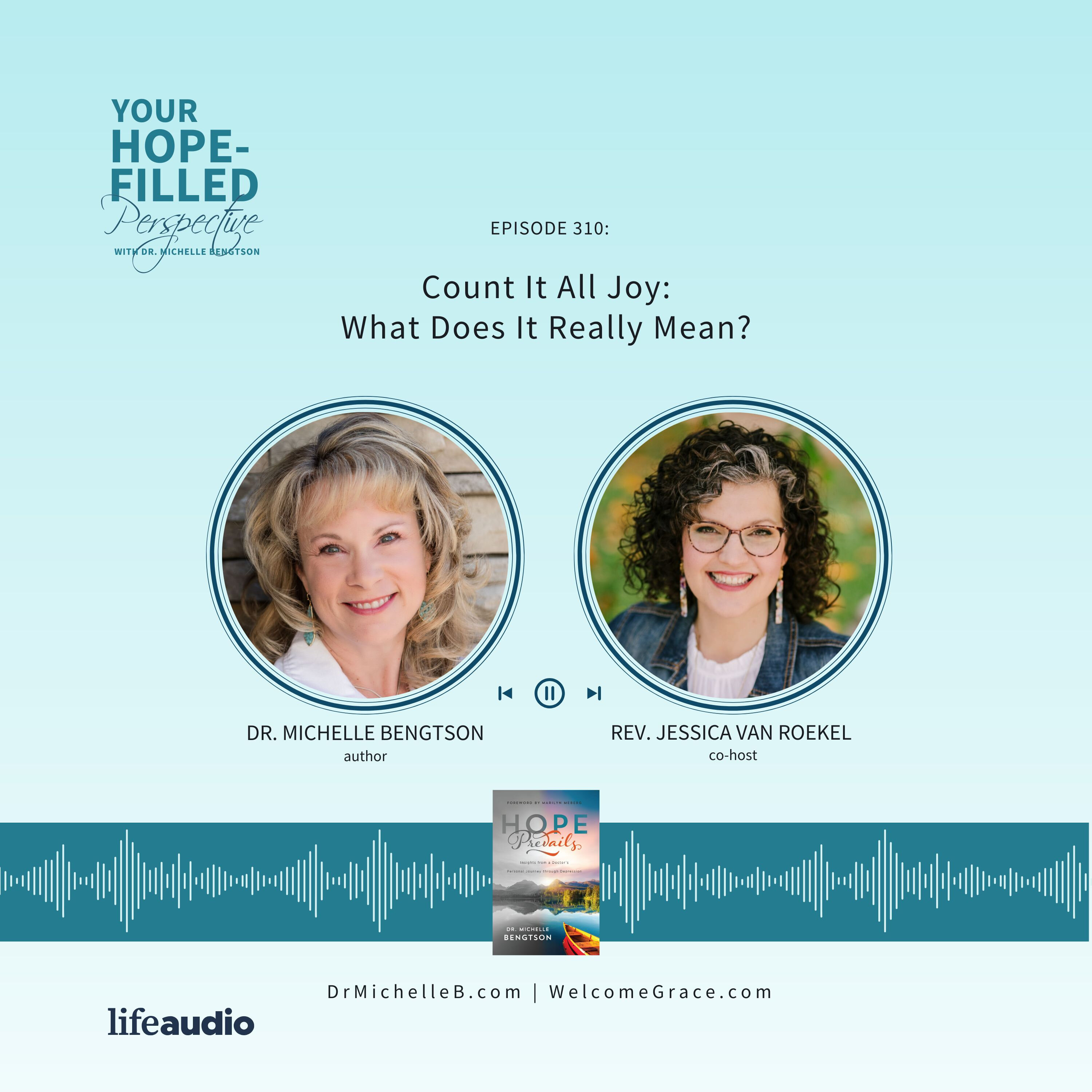
310 Count It All Joy: What Does It Really Mean?
March 20, 2025 - 35 min
Episode Summary: In honor of International Happiness Day, join me as I sit down with Rev. Jessica Van Roekel to explore what it really means to count it all joy. As we reflect on personal experiences and biblical examples, we’ll highlight the distinction between circumstantial happiness and the deep, steadfast joy that comes from trusting God through trials. You’ll gain a deeper understanding of how joy can be a deliberate response to life’s challenges, cultivating faith and steadfastness. Whether you’re navigating hardship or seeking a renewed perspective, this conversation offers hope and encouragement to find joy in every circumstance. International Day of Happiness aims to make people around the world realize the importance of happiness within their lives. This day encourages people to spread happiness through a small action. But what happens when actions don’t cut it, and the feeling of happiness lasts mere seconds? What do we do when the idea of happiness seems far off and impossible? Quotables from the episode: I liken joy and happiness, the difference between that is that a river usually has a source. And A river can get filled up with mud and leaves and twigs and even beavers come along and build dams and so further on down the little stream, it's just dried up, rocky, dry bed. But if you follow that stream, you eventually come to the source and the source is where it just bubbles out. And that's how I liken happiness and joy is that joy is the source. My relationship with the Lord is my source of really life. It's my source of source of strength. It's my source of everything. The breath that I breathe comes from God and that is my joy. So, I can have these circumstances like postpartum where it felt like continue on with the analogy that streambed dried up. It's like the depression built this dam between the feelings of happiness and yet that joy, the source was still bubbling and still there. From a neuroscience perspective, happiness and joy engage the brain in distinct but overlapping ways. Both emotions activate reward systems in the brain, but their triggers, durations, and neural pathways differ significantly. Happiness is often a fleeting emotional state triggered by external stimuli or achievements, like eating a favorite meal, receiving a compliment, or reaching a goal. The brain's happiness response is typically short-lived, subsiding once the rewarding experience ends or the novelty wears off. Joy is a deeper, more enduring emotional state that often arises from intrinsic sources, such as gratitude, faith, or connection with others. Unlike happiness, it does not rely solely on external circumstances. Joy is more sustainable than happiness because it is less tied to transient external factors and more rooted in internal states like faith, gratitude, and meaningful relationships. Happiness primarily relies on external stimuli and rewards, triggering immediate but temporary dopamine release Joy emerges from internal processes and deeper reflections, engaging serotonin pathways and regions involved in emotional and existential meaning. Happiness is short-term, as the brain’s reward circuitry adapts quickly to pleasurable stimuli (a phenomenon called hedonic adaptation). Joy is longer-lasting, supported by neural circuits linked to emotional regulation, contentment, and resilience. Happiness can be disrupted by stress, as the brain's focus shifts to managing perceived threats. Joy can coexist with stress, as it often stems from a sense of purpose or faith that provides emotional resilience during trials. Happiness happens to us while joy happens within us—fruit of the Spirit, a choice, endures hardships/sufferings. Happiness is a reaction but joy is a practice and a behavior, deliberate and intentional. In the Bible, happiness appears less than 30 times but joy appears hundreds of times. Counting it all joy when we face trials means we: experience God’s strength, feel the power of faith, hang on God’s powerful arm, and witness God’s work. When we “count it all joy” God proves himself faithful to produce steadfastness in our hearts. Scripture References: James 1:2-4, ESV “Count it all joy, my brothers, when you meet trials of various kinds, for you know that the testing of your faith produces steadfastness. And Let steadfastness have its full effect, that you may be perfect and complete, lacking nothing.” Esther 8:16, NIV
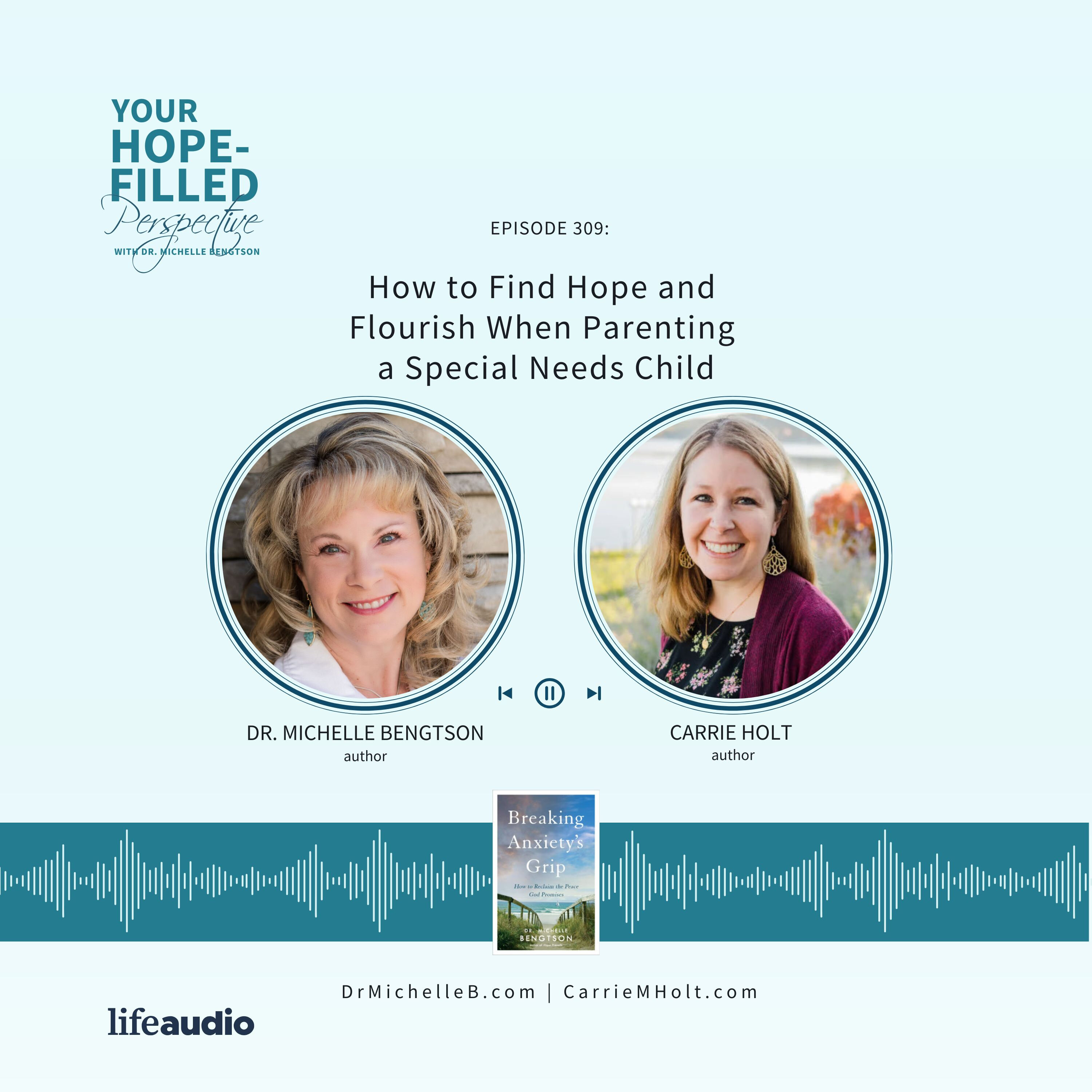
309 How to Find Hope and Flourish When Parenting a Special Needs Child
March 13, 2025 - 32 min
Episode Summary: Mothers of children with special needs experience a wide range of emotions: fear, disappointment, guilt, grief, despair. They have a yearning for relief but often feel isolated and inadequate as they look at the parenting experience of others. As you pour your energy and resources into raising a special needs child, it’s easy to struggle with feelings of isolation, competition, and overwhelm. For the special needs mom who yearns for community and support on what can be a lonely road, my guest, Carrie Holt, wants to remind you that you are not alone, your best IS good enough, and even on the hard days, there are blessings to be had. In honor of Developmental Disabilities Awareness Month, we’re sharing how to find hope and flourish when parenting a special needs child. Quotables from the episode: I have seen how families lose hope, feel strung out, and all alone living this life of being in and out of the hospital. From the time my son was around 20 months of age, I began volunteering at our local children’s hospital and have been passionate about encouraging others ever since. I was joyfully expecting our third child when at a 20 week ultrasound, our doctor told us something was wrong with the baby. We learned he had Myelomeningocele (Spina Bifida) and Hydrocephalus and would require two life-saving surgeries the first day of his life, with one following a few days later. I read a lot about his condition, grieved, and then planned – trying to control everything. It wasn’t until the last few years, that I have truly grieved that, and have been learning to live in the tension of lament. My son ended up being admitted for 64 days, 30 of those in the PICU. He came home with a trach, ventilator, and g-tube with 16 hours a day/7 days a week of home nursing care. He’s been in and out of the hospital repeatedly and to date has had 64 surgeries. The life of parenting a special needs child is continual, so we are all learning to live in the tension of our kids not being healed and how God is with us in all of this. I’m learning that it’s okay to feel disappointed, to lament that to God, and grieve the hard moments of realizing that my son isn’t going to be like other kids. I’m also trying to help him navigate life’s hard questions: “Why did God allow this? Why didn’t he heal me?” His complex emotions, doubts, and anger over being in a wheelchair has been really hard for us. Do not be afraid of grief. Sometimes we feel like it’s going to drown us, but it’s so important to take our messy emotions to God. It’s okay to take our messy emotions to God – even anger, doubt, and fear, but it’s actually essential to our relationship with God and how He meets us there. Emotions aren’t something we get over, they continually come up again and again, but we’ve learned some strategies to deal with them. Gratefulness, getting quiet, and lament are just a few. I think for me personally, it is learning to take this one day at a time, crying out in the pain when it’s there, and then also remembering that God is in control. It’s also just looking for the little gifts of hope and joy that he gives us on a daily basis. Probably the biggest thing has just been his presence and knowing him in a way that I had not known him if I wasn’t in this. As difficult as pain and suffering is, God has showed me his character and his presence and sometimes it's just that perspective shift of Lord show me you, instead of my eyes being on my pain and my suffering, show me how you've prepared me for this, show me your character, show me your glory, show me your comfort. Jesus wants to be present in your pain. Scripture References: Psalm 40:1-3 ESV I waited patiently for the LORD; he inclined to me and heard my cry. He drew me up from the pit of destruction, out of the miry bog, and set my feet upon a rock, making my steps secure. He put a new song in my mouth, a song of praise to our God. Many will see and fear, and put their trust in the LORD. Lamentations 3:21-26, ESV But this I call to mind, and therefore I have hope: The steadfast love of the LORD never ceases; his mercies never come to an end; they are new every morning; great is your faithfulness. “The LORD is my portion,” says my soul, “therefore I will hope in him.” The LORD is good to those who wait for him, to the soul who seeks him. It is good that one should wait quietly for the salvation of the LORD. Recommended Resources: The Other Side of Special, Navigating the Messy,
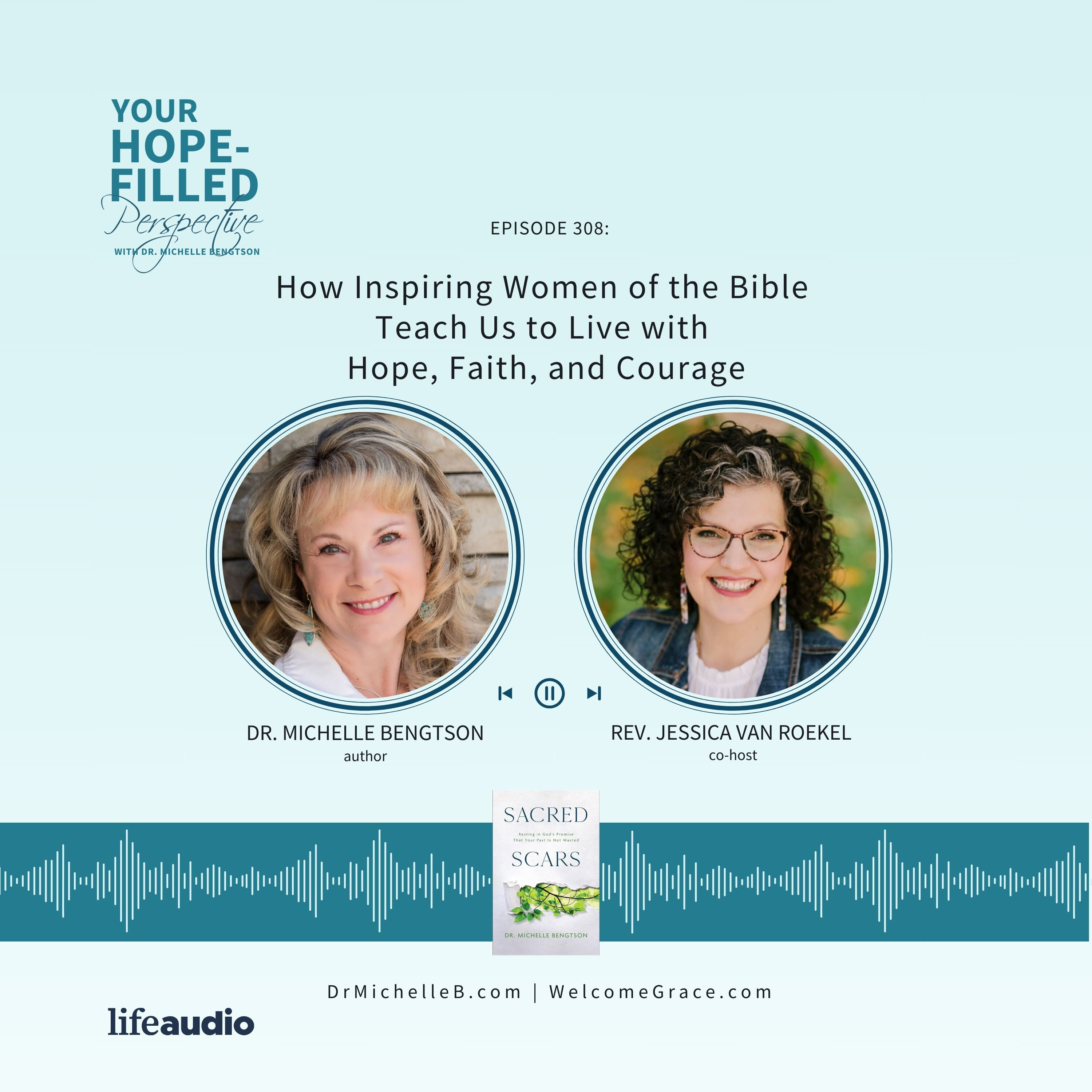
308 How Inspiring Women of the Bible Teach Us to Live with Hope, Faith, and Courage
March 6, 2025 - 29 min
Episode Summary: In celebration of International Women’s Day, a time to honor the achievements and contributions of women across the globe, this episode of Your Hope-Filled Perspective shines a light on some of the most inspiring women in the Bible. From Leah’s resilience in the face of rejection to Deborah’s fearless leadership, these women modeled faith and hope that transcend time and culture. As we explore their lives, we are reminded that the greatest advocate for equality and empowerment is Jesus, whose grace offers freedom to live courageously and faithfully. Join me with Rev. Jessica Van Roekel as we reflect on these timeless examples of strength and hope, and learn how they inspire us to live with faith and purpose today. Quotables from the episode: The greatest proponent of equality is Jesus, and we can only know the kind of freedom he brings when we receive his saving grace and live for him. He broke barriers between humanity and God, people groups, and genders. It’s when we live apart from him that we experience disparity. We're all equivalent at the foot of the cross and we can really only know the kind of freedom he brings when we receive his saving grace and live for him. You know Jesus broke barriers between humanity and God between people groups and genders and it's when we live apart from him that we really experience disparity. We can trace that through the old and new Testament. In fact, some influential and powerful women throughout the Bible are, you mentioned her Leah, she stayed strong through heartache and rejection. We had Jacobad, the mother of Moses, Abra led Israelites as a judge and prophetess for 40 years. Esther had the courage to say yes to God and in doing so she saved her people. Mary the mother of Jesus shows us how to have the courage to surrender completely. Then we have Ruth and Mary Bethany. These women were in a very male dominated society but God elevated them to positions of leadership. Sarah became my example of faith in the face of fear. She messed up and I messed up. And I think that's what I love so much about her is because she messed up royally. I mean, she created a whole mess with Ishmael and Isaac. She couldn't wait for God to fulfill his promise to her. And yet he did eventually, but she made this big mess. And yet she's still touted as a woman of faith in the Hall of, you know, Hebrews 11, the Hall of Fame chapter. She is our example of not to give into fear. And I think it's because of her faith, even in the midst of making so many mistakes. I would have to say that one of the women in the Bible who has inspired me the most was the woman at the well. You know, she lived a rejected life. She lived her life apart from other people. She had plenty of sins where she had messed up and yet I love that scripture says that Jesus had to go that way. He had to encounter her. And when he talked about her sin, it wasn't in a demeaning way, but it was to let her know, "Oh, I know so much more, and yet I'm still here with you. I'm still going against societal norms to have a conversation with you." And he revealed himself to her as Messiah and gave her hope to the point that she left and went and told people that she had met the Messiah. And so that's such a good example for me because I don't know about you, but when I've messed up, sometimes I don't even wanna go to God and tell Him, but He already knows. He already knows and it's a safe place. Jesus validated her when he said, "Go in peace. Your faith has made you well." In that, he gave her back her identity. He esteemed her. He loved her. And we don't even know her name, Jessica, but her story encourages us today and it encourages me to keep pursuing after Jesus when I've tried everything else. Jesus is the one place I need to go. Oh, yes. She is a wonderful example of we can feel so set aside. Unseen. Unseen. Rejected. And yet God elevated her. He saw her. He called her to go go into the fact that she believed that Jesus was her only hope and she pushed against the crowd. Leadership doesn't always mean, it doesn't always mean leading your family. It doesn't always mean leading in business. I think leadership, if we expand on that concept, means using our gifts to influence. And our gifts might be the gift of hospitality. It might be the gift of mercy. It might be the gift of compassion or encouragement, but when we use our God -given gifts to influence others, that is assuming a leadership role. Since Old Testament times, the idea of setting boundaries between men and women has been challenged. God has always placed women in leadership positions. Influential and powerful women exist throughout the Bible. Some inspiring women of the Bible include: Leah—strong through heartache and rejection Jochebed&mda
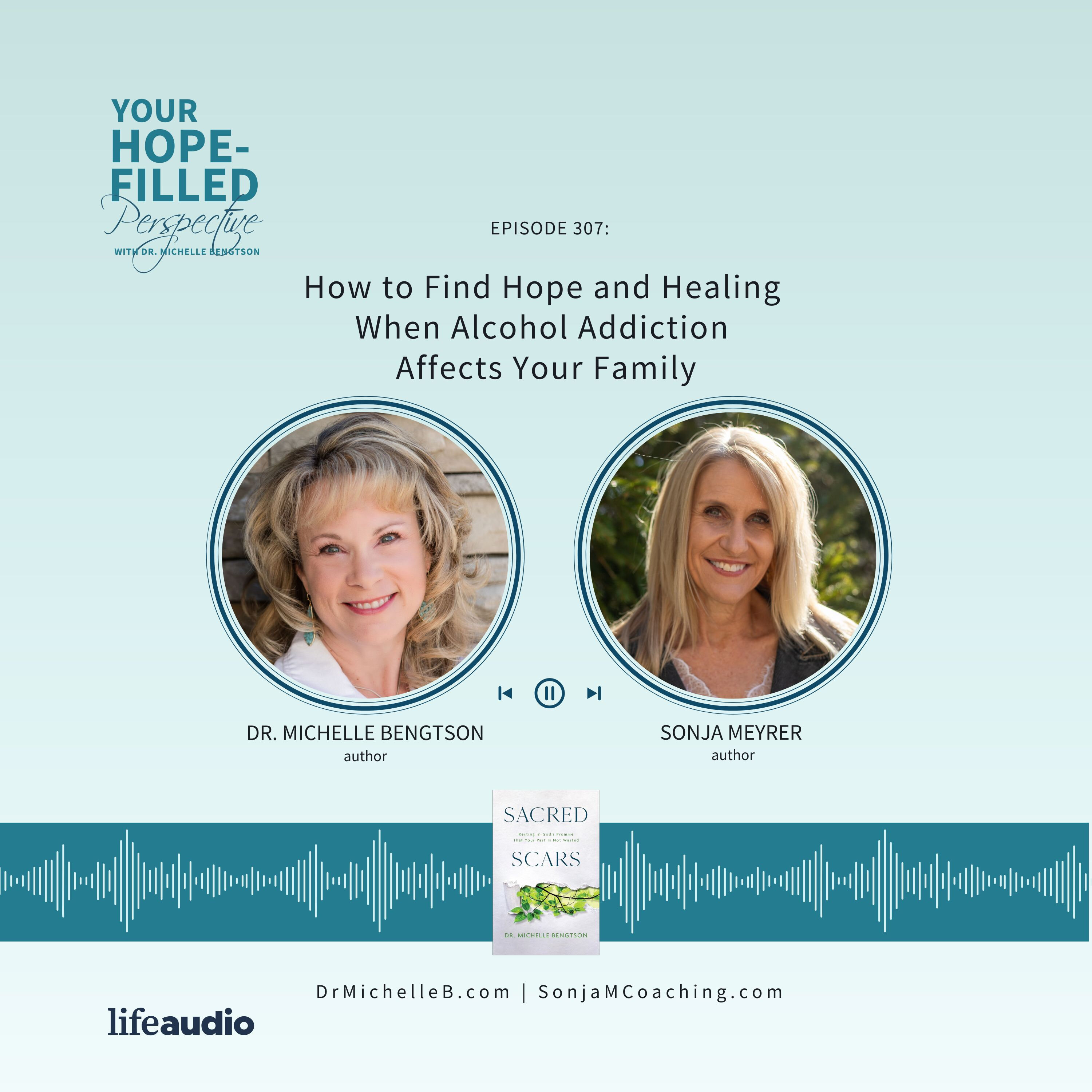
307 How to Find Hope and Healing When Alcohol Addiction Affects Your Family
February 27, 2025 - 25 min
Episode Summary: When alcohol addiction enters a family, it can bring heartache, uncertainty, and difficult choices. Sonja Meyrer shares her deeply personal journey of navigating her husband’s battle with alcohol addiction and his tragic loss. Through grief and unanswered questions, she discovered God’s presence in the midst of pain. Now, she helps others find healing, set healthy boundaries, and move forward with faith. If you're struggling with the effects of addiction in your family, this conversation offers encouragement and practical wisdom. Quotables from the episode: The word redemption really resonates because I believe that as Christ followers, nothing is wasted. Jesus had to have his scars in his resurrected body to prove that he was who he said he was and that he had done what he said he would do. So his scars are beautiful, and so are ours. Frequently our greatest areas of ministry come out of our greatest pain and woundedness. About twenty years into our marriage, the disease of alcohol addiction showed up. It wasn’t something I was familiar with—it was not present in my family growing up. Anyone who has suffered the effects of addiction can tell you that there is a day when “something is different.” On that day when something changed, I realized I was really in over my head. Especially as a spouse, who was raising children, I had to ask how do I fit into this. We say “in sickness and in health,” and that is true, but how do I protect myself and my kids? I didn’t start my career thinking, “I’d love to be an addiction specialist!” I don’t think anyone starts off that way. But it is my greatest honor and joy to sit with other people as a coach to find their own God-given hope and peace regardless of the choices of other people. Now I get to share out of my own experience how I navigated that time. When we will change the verbiage from “I have to” to “I get to,” first, that puts more control back into our hands in otherwise powerless situations, and, it gives us a more hope-filled perspective. So often, the ministries that many of us have are not ministries we would have asked for or signed up for but that is the goodness of God to bring you to the place where you can say “it’s my honor and privilege to walk with others.” The difference between those who stay angry and disgruntled versus those who say, “okay God, what do you have for me?” is operating from a place of surrender. Along the way, I had to learn to let go. I learned to say, “Even if, God, this all falls apart, you are still good, and I will still find my way forward.” I no longer hold onto what I think the future should look like. Instead, I say, “wherever you lead me is a good place to go.” In the letting go, it gives God the freedom to work his will, his way, and his timing. Unfortunately, my spouse fell into a deep depression and after a few years made the regretful decision to end his life. As a Christian spouse, I had to navigate the questions, “God why didn’t you heal him?” and at the same time, wondering, did I do everything well? Did I do it all right? The process of trying to learn how to honor the dignity of his suffering and yet still finding joy and happiness in my own life, was a process that takes some time. But I do believe that God can give us true joy from knowing He’s on our side if we’re willing to let go of our expectations of what we think life is supposed to be like. Some of us fall under faulty theology and think that if we’re doing the right things, we won’t experience suffering but that isn’t at all what Jesus told us. He said “in this world, you will experience trouble/suffering/pain, BUT take heart, I have overcome the world.” He also said, “If you’re going to follow me, you are going to suffer.” When I can get to the place that I can say, “This is for you to handle, God” it goes so much better. We say in the recovery community that “expectation is the root of all suffering.” Where we can live a life where are hands are truly open and we can say to God, “This is what I want…however, make me an instrument” and not be disgruntled and not get discouraged, it goes so much better. I’m grateful for Jesus’s example. In the garden before His death, Jesus cried out to God, “I don’t want to do this…if there is any other way please show me” but then he came back to the point of submission and surrender where he said “but I want your will more than I want min
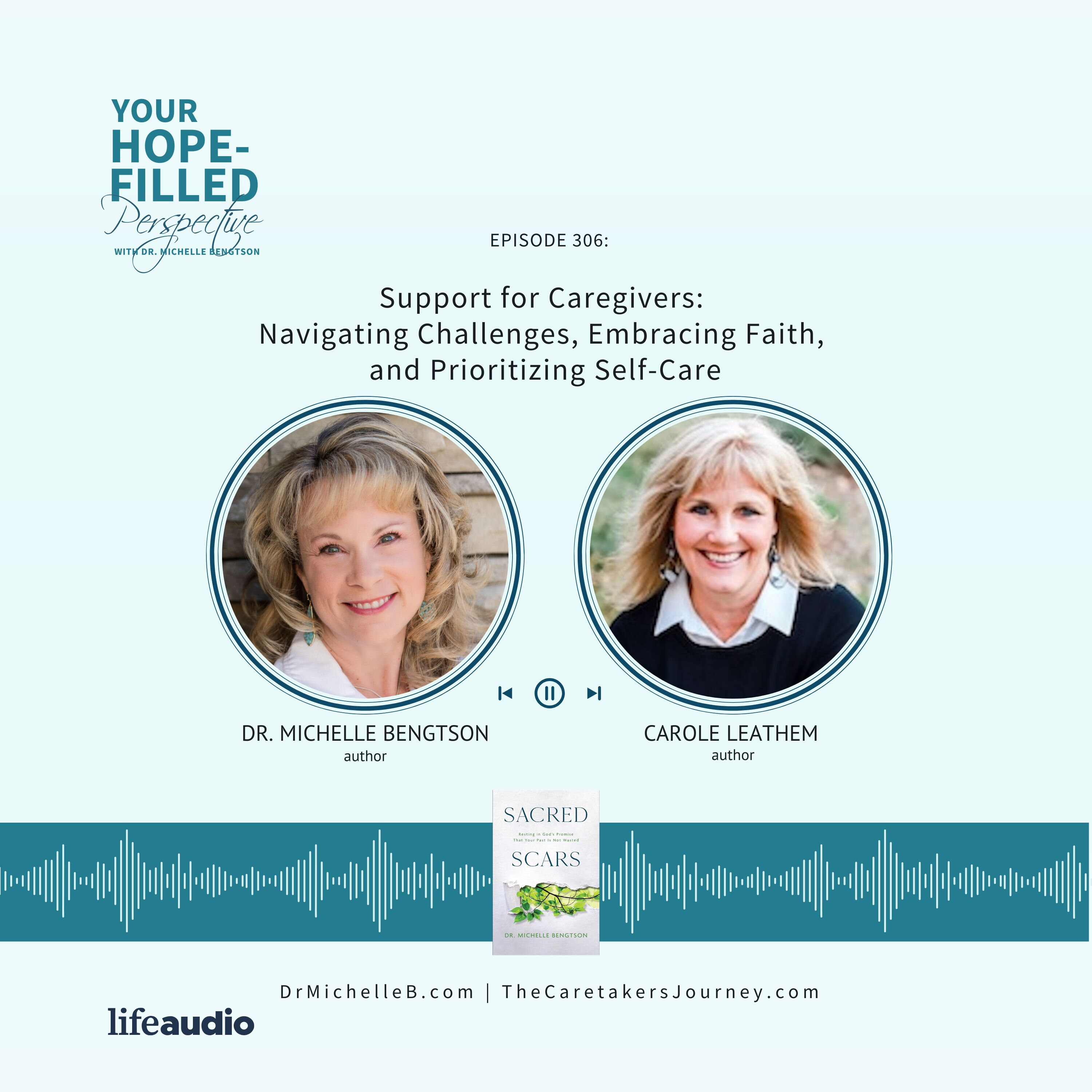
306 Support for Caregivers: Navigating Challenges, Embracing Faith, and Prioritizing Self-Care
February 20, 2025 - 37 min
Episode Summary: In this episode of Your Hope Filled Perspective, we honor National Caregivers Month by shining a light on the often unseen challenges and rewards of care-giving. Whether you’re a caregiver yourself or know someone who is, this conversation will provide encouragement, practical tips, and faith-based hope to navigate the emotional, physical, and spiritual toll of caregiving. Carole Leathem and I discuss the misconceptions about caregiving, the importance of self-care, and ways communities can better support caregivers. Join us as we explore how faith and community can sustain caregivers through their most challenging moments while also revealing the unexpected blessings caregiving can bring. Quotables from the episode: There are 55 million caregivers in the world. Caregiving often comes with, as you've alluded to, a range of emotions. You called it a roller coaster of emotions, which I think is a beautiful picture of just exactly what's that like. It comes with grief, it comes with guilt. Sometimes it even comes with resentment. How can caregivers process these feelings in a healthy way? Well, for me, it really boils down to what I call asking the right questions. Because early on, I was asking, why in the heck is this happening? What did I do to cause this? I would cry out to God and say, why are you allowing this? I would say all of these why, why, why, why, why questions. And the why questions would get me nowhere. And one day, God, in my quiet time, said to me, “Carol, you're asking the wrong question.” And the question I needed to be doing asking was “okay this is happening, now what?” What I have now done is, I have taken the focus off the why which is the focus on me and what I'm going through and what I'm feeling now I'm not diminishing those emotions but when I am focused on me and my hurt and my pain and my resentment, then I'm not doing anything to get myself off that hamster wheel or that roller coaster. When I ask the right question, which is, I make a statement to God, “okay, this is happening. Now, what?” Then I can take a step back, my eyes are us back on God. My heart is now open to the mistakes that I'm making. And the emotions now can one by one be dealt with. How do I deal with the resentment? Well, when I say to “God, you know, I didn't sign up for this.” God says to me, “Oh girl, yeah, you did. Remember those vows that you took 48 years ago.” And I'm like, yeah, you're right. And all that does is it just kind of puts it back into a perspective, because the perspective of focusing on me is not as healthy as the perspective of focusing on God. God didn't answer Job. When Job said why, God had something else for Job to learn. And when you say now what that offers God the opportunity to teach you either something about yourself, something about your spouse, or something about him. Yeah,… those are hard fought lessons. But I'm convinced that sometimes the only way we learn those lessons is walking through the hard times. I agree. I agree with you 100%. “ I have this space created so that when I walk into this room, it's me. It's my safe place. It's my place where I do my quiet time. It's my place where I work. It's my place where I do my podcasts. It's where I do everything in this room. I had to create a space. And fortunately, I had a room that I could do that with. So I come in here and if life is particularly hard, I have to tell myself 15 minutes is not going to change anything outside these walls, but it can make a big difference in me. We make time for the things that are important. We can always find time if we make it important enough. The real bottom line is, and I deal with a lot of caregivers, we make time for what's important, and that is the honest truth. … we can always find time if we make it important enough. So we have to make it important. And I hope that you're listening because that is such a valuable nugget because we really do make time for what's important. The number of times that I hear people say, oh, I just don't have time. You know, we all have 24 hours in a day, And we are all going to spend every minute of those 24 hours, but we will spend it on what we deem is important. And so if your loved one that you are caring for, if you deem them as important, you need to also deem your own self -care as important. You can still experience joy even in the midst of sorrow. It comes down to perspective and how we’re looking at it. It’s not about me, even though it feels like it’s about me. We have to know our limits. There are some things when we’re dealing with caregiving there’s things I can do, and then there’s things I can’t do. The hardest thing is to understand
Meet Your Host
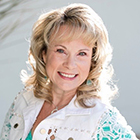
Dr. Michelle Bengtson is a hope concierge! She is a board-certified clinical neuropsychologist, international speaker, and award-winning author dedicated to offering hope, healing, and practical tools for mental, emotional, and spiritual well-being. As the host of the top-rated podcast Your Hope-Filled Perspective, she combines her professional expertise with biblical truth to empower listeners to overcome anxiety, depression, and life’s challenges through faith.
A trusted voice in Christian mental health, Dr. Bengtson is the bestselling author of Hope Prevails: Insights from a Doctor's Personal Journey through Depression and Breaking Anxiety's Grip. With over 30 years of clinical experience, she has helped countless individuals find lasting freedom from fear, stress, and discouragement.
Dr. Bengtson is a frequent media guest on platforms such as Focus on the Family, Life Today, and Moody Radio. Her writing and resources have been featured on outlets including Crosswalk, iBelieve, and Salem Media, equipping believers to embrace God's promises in every season.
Connect with Dr. Bengtson at DrMichelleBengtson.com, where she shares faith-based encouragement, expert insights, and free resources for cultivating a hope-filled life.
A trusted voice in Christian mental health, Dr. Bengtson is the bestselling author of Hope Prevails: Insights from a Doctor's Personal Journey through Depression and Breaking Anxiety's Grip. With over 30 years of clinical experience, she has helped countless individuals find lasting freedom from fear, stress, and discouragement.
Dr. Bengtson is a frequent media guest on platforms such as Focus on the Family, Life Today, and Moody Radio. Her writing and resources have been featured on outlets including Crosswalk, iBelieve, and Salem Media, equipping believers to embrace God's promises in every season.
Connect with Dr. Bengtson at DrMichelleBengtson.com, where she shares faith-based encouragement, expert insights, and free resources for cultivating a hope-filled life.
